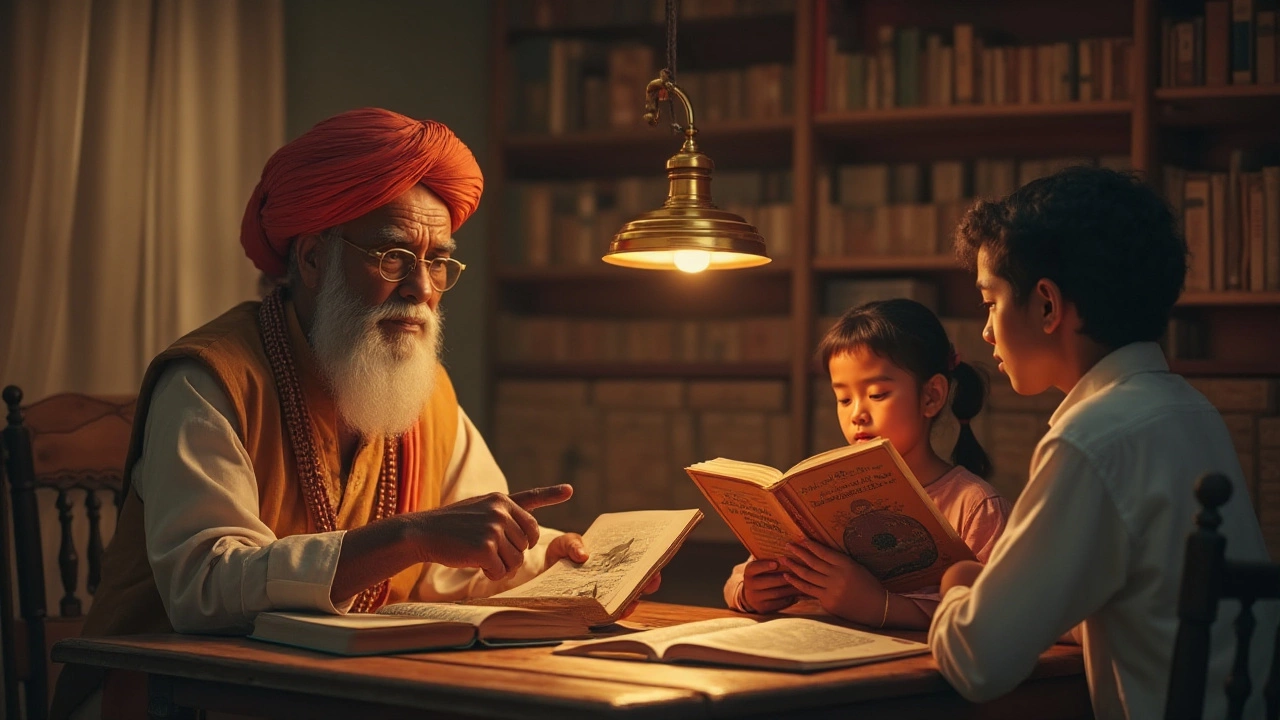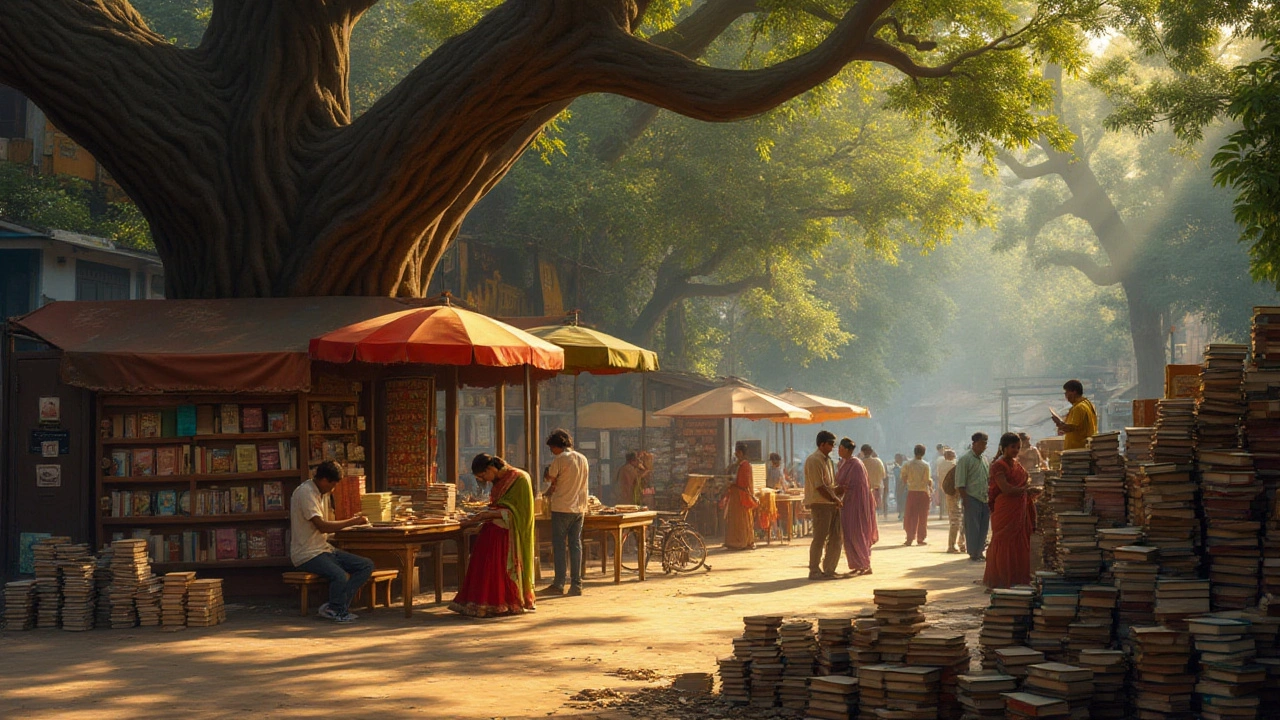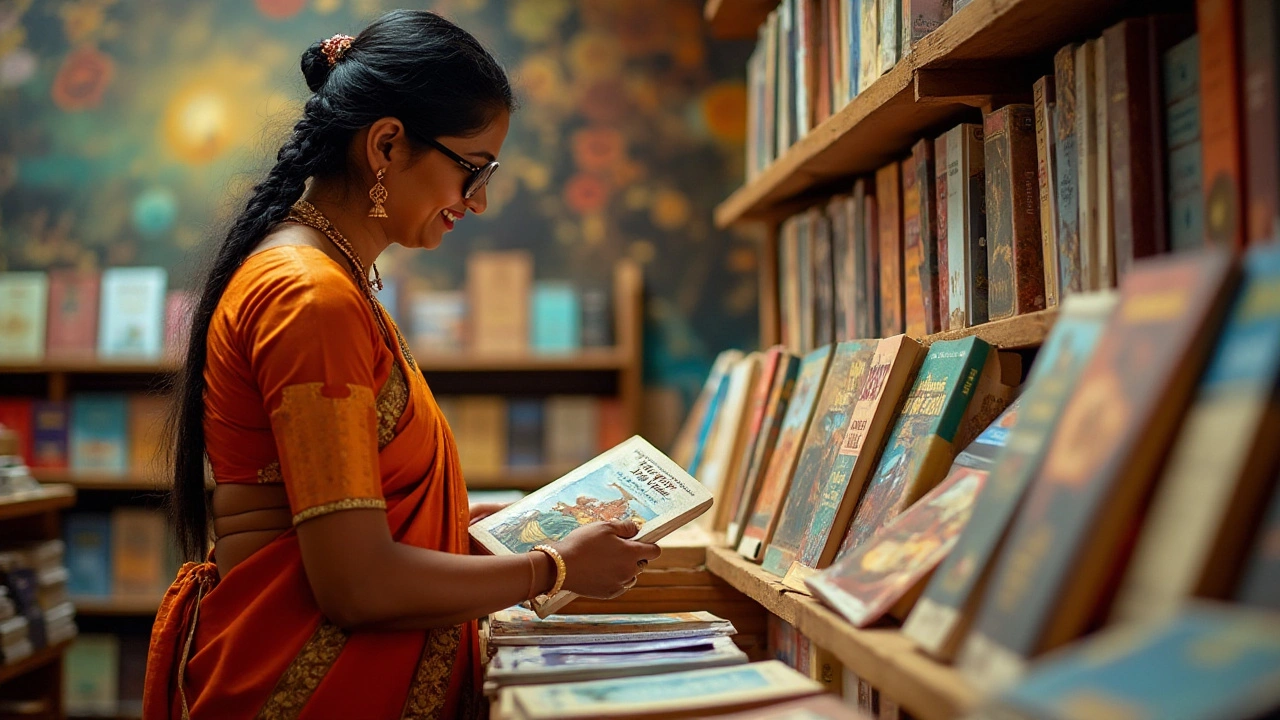Discovering the Greatest Novel Ever Written: A Journey Through Literary Masterpieces
 Jan, 19 2025
Jan, 19 2025
Deciding what makes a book the 'greatest ever written' is a question as old as literature itself, filled with subjectivity and passionate debates. It's a mosaic of elements—storytelling brilliance, emotional resonance, innovative language, and cultural impact—that come together to create a lasting impression.
Often, the books that claim a piece of this timeless title have influenced not just other writers but entire societies, shaping thoughts and movements across generations. From epics that delve into the human condition to narratives that paint a living portrait of their time, each book presents a unique proposition to readers.
Whether one gazes upon the dense shelves of a library or browses a digital bookstore, the journey to discovering the greatest book can be thrilling and deeply personal. Join us in exploring the titles and tales that have endeared themselves to readers through time, while also offering some pointers on selecting your next unforgettable read.
- The Criteria for Literary Greatness
- Iconic Books That Stand the Test of Time
- Prominent Best-Selling Authors and Their Masterpieces
- Cultural and Historical Impact of Top Novels
- Tips on Choosing Your Next Great Read
The Criteria for Literary Greatness
Defining the criteria for what makes a book truly great can feel like trying to capture lightning in a bottle. It's a task that invites spirited debates among readers and scholars alike. Yet, as we embark on this exploration, certain attributes consistently emerge as touchstones of literary greatness. At the heart of any extraordinary book is its storytelling prowess, where the narrative must engage, provoke, and resonate deeply with its audience. Readers often find themselves returning to such books, drawn by a compelling plot or the emotional journeys of characters that stay with them long after the final page is turned.
Another essential element is the book's contribution to language. Great literature often pioneers or perfects the use of language in a way that elevates its narrative to the realm of art. Consider Shakespeare's plays, revered not just for their stories but for the way they revolutionized the English language. A great book often adds memorable phrases and expressions to our daily lexicon, bridging cultures and ages. The impact of such language is profound and lasting, shaping the dialogues and interactions of its readers over time.
The cultural influencia of a book also plays a pivotal role in its classification as great. These works often act as mirrors to society, reflecting its hopes, struggles, and dreams. Books like Harriet Beecher Stowe's "Uncle Tom's Cabin" sparked discussions on critical social issues and catalyzed cultural shifts. The degree to which a book influences public discourse or inspires movements can significantly determine its enduring greatness. Such a book becomes more than a compilation of pages; it becomes a part of the very narrative of its readers' lives.
"A great book should leave you with many experiences, and slightly exhausted. You should live several lives while reading it." - William Styron
The emotional resonance of a novel cannot be underestimated either. A powerful book elicits emotions ranging from joy to sorrow, laughter to tears, and often offers readers an escape to worlds they might never have imagined. This emotional connection forms a bond between the reader and the narrative, often leaving a lasting, transformative impact. The greatest books serve as a haven of understanding and reflection, facilitating a connection so deep that it becomes a part of the reader's personal journey.
Finally, the timelessness of a book is a hallmark of its greatness. While many books capture the essence of their times, only a few manage to transcend them, delivering stories that continue to resonate across multiple generations. Books such as "Pride and Prejudice" or "Moby Dick" remain relevant because their themes are universal, speaking to fundamental human experiences and emotions. A truly great book is never constrained by the era it was written in; it is as meaningful today as it was when first published.
In creating an understanding of what makes a book great, it's crucial to acknowledge that everyone’s criteria may differ slightly. Some might prioritize intricate plots and unique characters, while others might place more weight on a book’s cultural impact or its literary innovations. Despite this variance, the books that resonate with these common threads of greatness often leave an indelible mark on the landscape of literature.
Iconic Books That Stand the Test of Time
Evaluating what makes a book truly iconic takes us on a tour through the annals of literary greatness. Some books don’t just tell a story—they create worlds, introduce us to timeless characters, and leave a lasting impression that echoes through the corridors of our minds long after we’ve turned the last page. Such books transcend their original contexts and resonate with universal themes of humanity, struggle, love, and redemption. For example, 'To Kill a Mockingbird' by Harper Lee is hailed not only for its gripping narrative but also for its profound themes of racial injustice and moral growth, which continue to educate and inspire readers globally.
Classic novels such as 'Pride and Prejudice' by Jane Austen remain relevant because they expertly capture the intricacies of human relationships and societal expectations. Austen's still resonates with readers today, navigating the delicate balance between romance and realism with a wit that makes her work endure. These books become cultural touchstones, reflecting the epochs in which they were written while maintaining a remarkable ability to relate to the present day’s readers. Through this blend of timeless narrative structure and enduring human truths, they earn their place in the pantheon of literature.
The Modern Best-Sellers Joining the Ranks
In more recent times, books like 'Harry Potter and the Philosopher's Stone' by J.K. Rowling have achieved a similar iconic status, not only fostering a renewed love of reading in younger generations but also creating a cultural phenomenon that spans across books, films, and themed attractions. The magic of Rowling’s world lies in its appeal to both children and adults, weaving a tapestry rich with adventure, friendship, and a distinctive kind of escapism that appeals to anyone seeking solace from reality. As with classic literature, the ability of a story to capture the imaginations of successive generations is a testament to its greatness.
"A great book is like a friend that never lets you down," opined Ralph Waldo Emerson, capturing a sentiment shared by bibliophiles the world over. Indeed, each reader may have their personal favorite, shaped by the unique bond they form with certain stories.
From epic tales like 'Moby Dick' by Herman Melville to the poignant truths found within 'One Hundred Years of Solitude' by Gabriel García Márquez, many of these books also offer commentary on the human predicament and the mysteries of life itself. They have shaped not only readers’ individual perspectives but have also influenced broader cultural and sociopolitical landscapes. It is through this deep-seated resonance that they continue to attract new readers, affirming their status as literary cornerstones.

Prominent Best-Selling Authors and Their Masterpieces
When diving into the world of best-selling authors, several names come to light, celebrated not just for their commercial success but also for how their works resonate on a profound level. Among these giants of literary history, J.K. Rowling's 'Harry Potter' series is a tale of magic that has captivated millions across the globe. Her ability to create a universe that appeals to both young and older generations alike is a testament to her storytelling genius. Rowling's journey from struggling writer to a household name is as magical as the world she so intricately crafted. Each book in the series was a bestseller upon release, and the wizarding world provided a refuge and a guidepost for readers navigating the challenges of growing up.
Another colossal figure in literature is Agatha Christie, the best-selling novelist and the 'Queen of Mystery'. Her novel 'And Then There Were None' exemplifies her mastery in crafting intricate plots and intriguing characters. Christie’s knack for suspense and plot twists keeps readers on their toes, eager to turn the next page. With over a billion copies of her works sold in English, she holds the distinction of being the most translated author in history. As the creator of the beloved detective Hercule Poirot, Christie’s influence stretches beyond books, inspiring theatrical adaptations and screenplays that continue to intrigue audiences today.
In the realm of literary classics, few can overlook the impact of Leo Tolstoy's 'War and Peace', a tome that chronicles the Russian landscape amidst Napoleonic wars. Tolstoy’s detailed narrative blurs the line between historical accuracy and fiction, providing a panoramic view of human struggles and triumphs. His work resonates with readers because it taps into fundamental human emotions, from love and ambition to power and destiny. Tolstoy’s deft command of Russian society's intricate tapestry is a marvel that earns him enduring respect from literary critics and enthusiasts alike. A quote from the esteemed writer Henry James says it well:
'The greatest novel that has ever been written.'
When talking about impact and cultural resonance, we cannot ignore Gabriel García Márquez's 'One Hundred Years of Solitude'. This novel wielded the power of magical realism to explore the mythical and the real. Márquez’s unique narrative style reshaped the Latin American literature landscape. Through the Buendía family saga in the fictional town of Macondo, he delved into the complexities of solitude, legacy, and human nature. Márquez’s ability to weave magic into everyday life captured the imagination of readers worldwide, earning him the Nobel Prize in Literature in 1982.
In this landscape, Haruki Murakami's distinct voice emerges with works like 'Norwegian Wood', which explores themes of loss and love with surreal undertones. Murakami defies conventional plot structures while offering readers a glimpse into post-war Japanese society, exploring universal themes through a distinctly localized lens. His stories often blend whimsical elements with prophetic depth, drawing readers into a world where the lines between reality and dreams blur gracefully.
The works of these best-selling authors aren't just top novels; they represent diverse voices and revolutionary ideas that challenge and inspire us. Whether you’re stepping into a whimsical world of a young wizard or unraveling dark mysteries with a legendary detective, the books crafted by these authors invite readers to explore new perspectives and get lost in narratives that enrich our lives. Each masterpiece holds a special place in the literary ethos, inviting timeless discussions about the nature of storytelling and the enduring magic contained within the pages of a book.
Cultural and Historical Impact of Top Novels
The 'greatest book ever written' is a title that many pursue, yet only a select few achieve it in a way that resonates through time. These iconic books serve as cultural milestones, deeply influencing the world far beyond their pages. From Orwell's "1984," which introduced concepts of totalitarian control and surveillance that still hold relevance today, to Steinbeck's "The Grapes of Wrath," portraying the plight and resilience during the Great Depression, literature shapes our understanding of history and culture. Such books endure because they offer a reflective lens through which readers can evaluate the societal norms and values of their times, often challenging the status quo and inspiring changes that ripple through generations.
Many novels have transcended linguistic and geographical boundaries, impacting various cultures in profound ways. Take, for instance, Gabriel García Márquez's "One Hundred Years of Solitude," a seminal work that brought the magic realism genre of Latin America to a global audience. This novel captured the spirit and struggles of the continent, weaving its mythic and historical realities into a tapestry appreciated worldwide. This illustrates that literature is not just a reflection of society but also a catalyst that can initiate dialogue and understanding across diverse cultures. As Victor Hugo once said,
"A writer is a world trapped in a person." This sentiment emphasizes the power of authors to communicate universal truths that resonate with individuals everywhere.
Over the years, certain books have sparked movements, led to legislative change, or even inspired revolutions of thought. Harriet Beecher Stowe's "Uncle Tom's Cabin," for instance, is credited with galvanizing the abolitionist movement in the United States. By exposing the brutal realities of slavery, it played an instrumental role in shifting public opinion. A similar impact was seen with "To Kill a Mockingbird" by Harper Lee, which became a cornerstone in American literature and civil rights discussions, illustrating racism and courage through the innocent eyes of a child. These books engage with readers on a deeper level, often initiating personal reflection and societal discourse.
It’s fascinating to note how novels continue to adapt and maintain relevance through evolving mediums. Today, many literary classics are explored anew through film adaptations, theater, and more recently, through multimedia experiences and video games, broadening their reach and renewing their impact. Such adaptations breathe new life into these stories, often bringing them to audiences who might not engage with traditional books. This trend shows the versatility and enduring appeal of great literature. For instance, "Pride and Prejudice" by Jane Austen has seen countless adaptations, from television series to feature films, always finding new ways to reinterpret the social intricacies and romantic entanglements that have captivated audiences since its publication.
By understanding the cultural and historical contexts of these great novels, readers not only appreciate their artistry but also their ability to transform perspectives and societies. These books encapsulate timeless themes, yet continually speak to the human experience in all its complexity. They are not static relics of the past but living conversations that invite readers to explore and re-explore their narratives in light of new insights and circumstances. Such is the power and legacy of literature's most enduring masterpieces.

Tips on Choosing Your Next Great Read
Choosing your next great read can feel like embarking on a voyage across a sea of unlimited stories, each offering a promise of adventure, knowledge, or deep emotional connection. One vital element in this journey is knowing what you crave in a book. Are you looking for something to uplift your spirits, challenge your perspectives, or perhaps provide a historical context? Defining your purpose can help tailor your selection to books that truly resonate with your current frame of mind.
Another excellent tip is to leverage the vast community of readers. Book clubs, whether online or in-person, can offer myriad recommendations based on collective experiences. Engaging with other avid readers often introduces you to titles and authors you might not have considered. Goodreads, for instance, is an online resource where you can see what others are reading, their reviews, and even track your own reading journey. As Clive Barnes aptly puts it,
“Books are not made for furniture, but there is nothing else that so beautifully furnishes a house.”This sentiment highlights how literature can truly enhance our personal spaces and perspectives.
It’s also important to consider the genre you are drawn to. If you've always leaned towards mystery novels, maybe it's time to explore something different like a classic literary piece or a contemporary romance. Stepping out of your comfort zone can reveal new favorites that enrich your reading portfolio. Moreover, selecting books from diverse authors can broaden your worldview and introduce you to different cultural narratives that you may have never encountered before.
Another strategic approach is keeping an eye on best-selling author lists, as these provide a curated collection of works that have captured the attention and praise of readers worldwide. Often, such lists include both timeless classics and fresh releases, offering a balanced mix of literature to explore. It's worth noting that despite their popularity, not every best-selling book will align with your taste, but they are undoubtedly a good starting point for exploration.
Lastly, don’t underestimate the power of a recommendation from a trusted friend. Friends often know your preferences and may guide you towards books that profoundly impacted their own lives. Having a book recommended by someone who knows you well can be a deeply satisfying experience and bring a personal touch to your reading journey. In summary, choosing your next book involves a blend of introspection, exploration, and enthusiasm for the endless possibilities that literature offers. Let your curiosity lead you, and you may stumble upon the greatest book ever, at least for you.